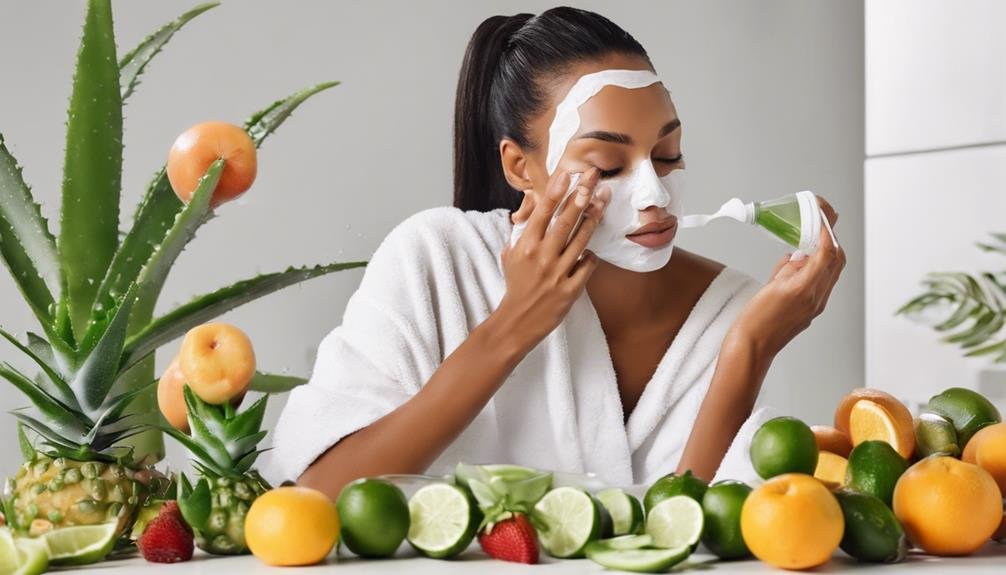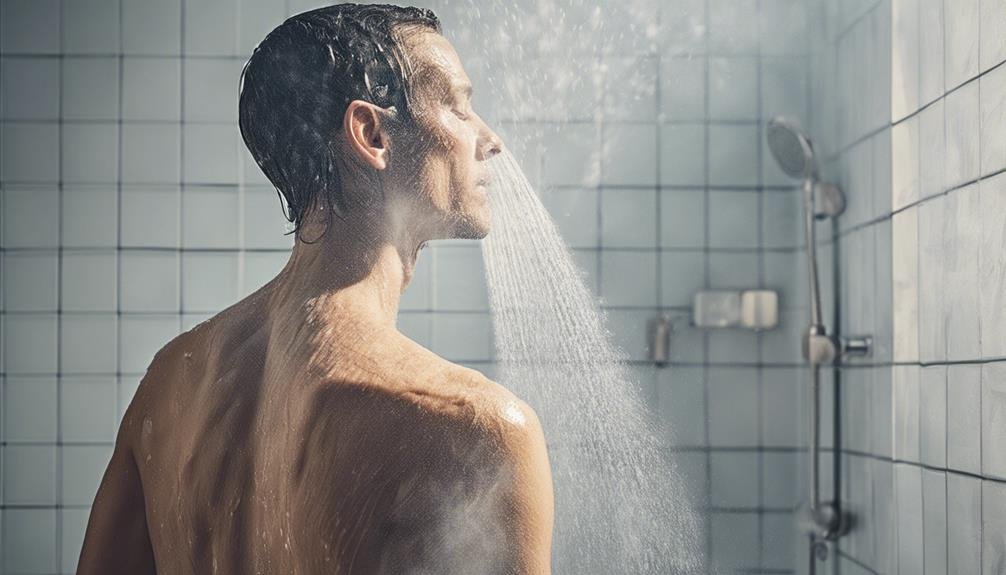"Cherishing Little Steps - A Haven for Baby and Family Journeys"
How to Keep Your Skin Healthy and Hydrated
To maintain healthy and hydrated skin, it is crucial to follow a few simple yet effective steps. Ensuring proper hydration through water intake is just the start. Incorporating a reliable moisturizer into your routine can work wonders, but there are more secrets to uncover. By exploring the right cleanser for your skin type and understanding how sun protection plays a vital role, you can enhance your skin's health and appearance. Stay tuned to discover more valuable tips that can transform your skincare regimen.
Key Takeaways
- Drink plenty of water daily to maintain skin hydration and elasticity.
- Use a moisturizer to keep skin soft, supple, and protected.
- Choose a gentle cleanser suitable for your skin type.
- Protect your skin from the sun with sunscreen and protective clothing.
- Eat a balanced diet rich in antioxidants for skin health.
Importance of Hydration

Ensuring proper hydration is essential for maintaining healthy and glowing skin. Hydration plays a vital role in supporting the skin's functions, such as regulating temperature, eliminating toxins, and maintaining elasticity. When your skin lacks adequate moisture, it can appear dull, dry, and prone to premature aging.
Water is crucial for maintaining the skin's natural barrier function, preventing excess water loss, and promoting a plump and youthful complexion. Dehydrated skin is more susceptible to irritation, inflammation, and a weakened barrier, which can lead to issues like acne and sensitivity.
To keep your skin well-hydrated, incorporate hydrating ingredients like hyaluronic acid, glycerin, and ceramides into your skincare routine. Additionally, using a humidifier in dry environments can help increase moisture levels in the air, benefiting your skin.
Drink Plenty of Water
Hydration is key to maintaining skin health, and one of the simplest and most effective ways to ensure your skin stays adequately hydrated is by drinking plenty of water. Water is essential for overall health, and its benefits extend to your skin, keeping it supple, smooth, and youthful.
Here is a breakdown of how water impacts your skin:
| Benefits of Drinking Water | How it Helps | Recommendation |
|---|---|---|
| Increases skin elasticity | Helps maintain firmness and tone | Drink at least 8 glasses daily |
| Improves skin complexion | Reduces dullness and blemishes | Carry a reusable water bottle |
| Flushes out toxins | Clears skin and prevents acne | Infuse water with fruits/herbs |
Moisturize Daily
To maintain healthy and hydrated skin, daily moisturizing is essential. Moisturizing not only helps in keeping your skin soft and supple but also creates a protective barrier against environmental stressors.
Here are four key reasons why daily moisturizing should be a crucial part of your skincare routine:
- Hydration: Moisturizers help to lock in moisture, preventing your skin from becoming dry and flaky.
- Anti-aging: Regularly moisturizing can help reduce the appearance of fine lines and wrinkles, keeping your skin looking youthful.
- Skin barrier support: Moisturizers strengthen your skin's natural barrier, protecting it from irritants and pollutants.
- Skin health: Keeping your skin well-moisturized promotes overall skin health, reducing the risk of issues like eczema or psoriasis flare-ups.
Choose the Right Cleanser
For optimal skin health and hydration, selecting the right cleanser is paramount. When choosing a cleanser, opt for one that matches your skin type. If you have dry skin, look for a hydrating cleanser with ingredients like hyaluronic acid or glycerin. For oily or acne-prone skin, a gentle foaming cleanser containing salicylic acid or benzoyl peroxide can be beneficial. Combination skin may benefit from a mild, non-comedogenic cleanser. It's essential to avoid harsh ingredients like sulfates, alcohol, or artificial fragrances that can strip your skin of its natural oils and cause irritation.
Consider the texture of the cleanser as well. Cream or lotion cleansers are great for dry skin, while gel cleansers work well for oily skin. Remember to cleanse your face twice a day, in the morning and evening, to remove dirt, oil, and makeup. Be gentle when cleansing to avoid irritating your skin. Finding the right cleanser tailored to your skin's needs can help maintain a healthy skin barrier and prevent dehydration.
Protect Your Skin From Sun

When it comes to maintaining healthy and hydrated skin, protecting it from the sun is crucial. Exposure to the sun's harmful UV rays can lead to premature aging, sunburn, and an increased risk of skin cancer. To keep your skin safe and radiant, follow these expert tips:
- Apply sunscreen daily: Choose a broad-spectrum sunscreen with at least SPF 30 and reapply every two hours, especially if you're sweating or swimming.
- Seek shade: Limit your time in direct sunlight, especially during peak hours between 10 a.m. and 4 p.m.
- Wear protective clothing: Opt for lightweight, long-sleeved shirts, wide-brimmed hats, and sunglasses with UV protection to shield your skin and eyes.
- Avoid tanning beds: Artificial UV radiation from tanning beds can be just as harmful as natural sunlight, increasing your risk of skin damage and cancer.
Eat a Balanced Diet
Maintaining a balanced diet plays a vital role in keeping your skin healthy and hydrated. Your skin's appearance is greatly influenced by what you eat. Including a variety of fruits, vegetables, lean proteins, and whole grains in your daily meals provides essential nutrients that support skin health.
Foods rich in antioxidants, such as berries, spinach, and nuts, help protect your skin from damage caused by free radicals and environmental stressors. Omega-3 fatty acids found in fish, chia seeds, and walnuts can help maintain skin elasticity and hydration. Additionally, staying hydrated by drinking an adequate amount of water each day is crucial for keeping your skin supple and vibrant.
Avoiding excessive consumption of processed foods, sugary treats, and greasy snacks can help prevent skin issues like acne and inflammation. By nourishing your body with a balanced diet, you're effectively enhancing the health and appearance of your skin from the inside out.
Get Adequate Sleep

Adequate sleep is essential for maintaining the health and appearance of your skin. Your skin goes into repair and regeneration mode while you sleep, making it crucial to get enough shut-eye for a healthy complexion. Here are four key reasons why prioritizing sleep can benefit your skin:
- Collagen production: During deep sleep stages, your body produces collagen, a protein that keeps your skin firm and supple.
- Cellular repair: Sleep allows your skin cells to repair and renew, promoting a glowing complexion.
- Reduction of inflammation: Lack of sleep can lead to increased inflammation in the body, which can exacerbate skin conditions like acne and eczema.
- Prevention of premature aging: Quality sleep is linked to a reduction in fine lines, wrinkles, and dark circles, helping you maintain a youthful look.
Incorporate Antioxidants
To further enhance the health and appearance of your skin, incorporating antioxidants into your skincare routine is a smart choice. Antioxidants play a crucial role in protecting your skin from damage caused by free radicals, which can accelerate the aging process and lead to various skin concerns. By neutralizing these free radicals, antioxidants help maintain the youthful glow of your skin and promote overall skin health.
Some common antioxidants found in skincare products include Vitamin C, Vitamin E, green tea extract, and resveratrol. These powerful ingredients work to combat oxidative stress, reduce inflammation, and brighten your complexion. Incorporating products rich in antioxidants, such as serums, moisturizers, and face masks, can help rejuvenate your skin and maintain its natural radiance.
When shopping for skincare products, look for formulations that contain a combination of antioxidants to maximize their benefits. Consistent use of antioxidant-rich products, alongside a healthy lifestyle and skincare routine, can help you achieve glowing, healthy skin that looks and feels nourished from within.
Limit Hot Showers

For healthier and more hydrated skin, it's essential to consider the impact of your shower routine. Hot showers may feel soothing, but they can actually strip your skin of essential oils and moisture, leading to dryness and irritation. Here are some key reasons why limiting hot showers can benefit your skin:
- Preserves Natural Oils: Hot water can disrupt the skin's natural barrier, causing it to lose moisture and essential oils.
- Reduces Inflammation: Excessive heat can aggravate skin conditions like eczema and rosacea, leading to increased redness and irritation.
- Prevents Dryness: Hot showers can deplete the skin's natural hydration levels, making it prone to flakiness and roughness.
- Maintains Skin Elasticity: Prolonged exposure to hot water can weaken the skin's elasticity, contributing to premature aging signs like wrinkles and sagging.
Avoid Harsh Chemicals
Protecting your skin from harsh chemicals is crucial for maintaining its health and hydration. Harsh chemicals can strip the skin of its natural oils, leading to dryness, irritation, and even long-term damage.
When choosing skincare products, opt for gentle, fragrance-free options that are specifically formulated for sensitive skin. Look for labels that say "non-comedogenic," meaning they won't clog pores, and "hypoallergenic," which reduces the risk of allergic reactions.
Avoid products containing ingredients like sulfates, parabens, phthalates, and formaldehyde, as these can be harsh on the skin. Instead, seek out products with natural ingredients like aloe vera, shea butter, and coconut oil, which are known for their soothing and hydrating properties.
Remember to always read the ingredient list before purchasing a product to ensure it meets your skin's needs.
Practice Stress Management

Skin health isn't solely dependent on external factors like skincare products. Managing stress plays a crucial role in maintaining healthy and hydrated skin. Here are four key ways stress management can benefit your skin:
- Reduces Inflammation: High levels of stress can lead to increased inflammation in the body, which can manifest on your skin as redness, acne, or other skin conditions.
- Promotes Healing: Chronic stress hinders the skin's ability to repair itself, making it harder for wounds and blemishes to heal effectively.
- Balances Hormones: Stress can disrupt hormone levels, leading to skin issues like increased oil production and breakouts. Managing stress can help regulate these hormones.
- Boosts Skin Barrier Function: Stress can weaken the skin's protective barrier, making it more prone to dryness and irritation. By practicing stress management techniques, you can support your skin's natural defenses.
Regular Exercise
Regular exercise is a fundamental component of a holistic approach to maintaining skin health and hydration. When you engage in physical activity, you increase blood flow, which helps nourish skin cells and keep them healthy. Sweating during exercise also helps to flush out toxins from your skin, giving you a natural glow. Furthermore, regular exercise can reduce stress levels, which in turn can help prevent skin issues like acne and eczema.
Studies have shown that individuals who exercise regularly tend to have firmer skin and fewer wrinkles compared to those who lead a more sedentary lifestyle. Aim for a mix of cardiovascular exercises, strength training, and flexibility workouts to reap the full benefits for your skin.
Remember to stay hydrated before, during, and after your exercise routine to support your skin's elasticity and overall health. By making regular exercise a priority in your skincare routine, you aren't only benefiting your physical health but also promoting a radiant and hydrated complexion.
Frequently Asked Questions
Can Certain Foods Cause Skin Dehydration?
Certain foods can indeed cause skin dehydration. Foods high in salt, caffeine, and alcohol can lead to water loss in your skin. It's important to balance your diet with hydrating foods like fruits and vegetables for optimal skin health.
Is It Necessary to Use Different Moisturizers for Day and Night?
You should use different moisturizers for day and night as they cater to unique skin needs during these times. Day creams focus on protection and hydration, while night creams aid in repair and rejuvenation, ensuring optimal skin health round the clock.
How Often Should I Exfoliate My Skin?
You should exfoliate your skin 1-3 times per week. Over-exfoliating can lead to irritation and dryness, while under-exfoliating may not effectively remove dead skin cells. Find a gentle exfoliator suitable for your skin type to maintain a healthy glow.
Can Wearing Makeup Affect Skin Hydration?
Yes, wearing makeup can affect skin hydration. Some makeup products may contain ingredients that can dry out your skin. Make sure to choose hydrating makeup products, cleanse your face thoroughly, and moisturize to maintain skin hydration.
Do Skin Types Determine Hydration Needs?
Oh, absolutely! Skin types play a crucial role in determining hydration needs. Your oily skin may need lighter moisturizers, while dry skin craves rich hydration. Understanding your skin type is key to keeping it healthy and glowing.
Conclusion
In conclusion, maintaining healthy and hydrated skin is essential for a glowing complexion. Just as a flower needs water to bloom, your skin thrives on hydration to stay soft and supple. By drinking plenty of water, moisturizing daily, and protecting your skin from the sun, you can nurture your skin from within and maintain its natural radiance. Remember, a little self-care goes a long way in achieving healthy and hydrated skin.

